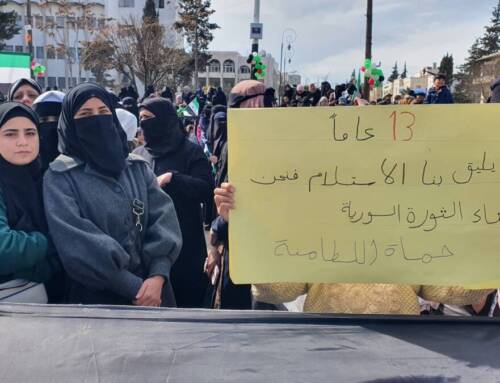‘It’s cheap, and it’s deadly’: Regime helicopters test new weapon over Aleppo city
An undetonated explosive hose fell near al-Breij in the northern […]
12 June 2016

On Saturday afternoon, two regime helicopters dropped 100-meter-long, plastic hoses packed with explosives over Aleppo city, the first time such weaponry has been used in this manner, eyewitnesses told Syria Direct.
The helicopters released the explosive hoses over the northwestern, opposition-controlled neighborhood of al-Breij, near the only supply road for rebel-held Aleppo city.
Eyewitnesses believe that these hoses—filled with TNT and C-4—typically serve as a mine-clearing device. On Saturday, however, shrapnel also filled the chambers, reportedly to maximize the unconventional weapon’s destructive power.
In a weekend of shelling and barrel bombs that claimed more than 50 lives across the province, Saturday’s attacks on the provincial capital marked the first time this weaponry has been deployed in Aleppo.
Although the strikes hit a largely vacant area, eyewitnesses fear the introduction of the improvised weapons to the battle for Aleppo forebodes more destruction to come.

“[Al-Breij] was nothing more than a testing ground for the regime, an opportunity to demonstrate the magnitude and effectiveness of their new weapons,” Mohammed al-Halabi, an Aleppo citizen journalist, told Syria Direct.
This is not the first time the regime has weaponized the mine-clearing technology over the course of the war. In 2014, regime forces launched similar explosive hoses from a UR-77 mine-clearing vehicle in their campaign to retake the Damascus neighborhood of Jobar.
The Russian-made device features a turret-like structure, firing a small rocket with a long, explosives-packed hose in tow.
Saturday’s attacks are the first time an explosive hose has been dropped from a helicopter, all three Aleppo activists Syria Direct spoke with on Sunday said.
“It’s cheap, and it’s deadly,” said al-Halabi. “You don’t need experience. All you need is to drop the hose from a helicopter onto a densely crowded residential area.”
The attack seriously injured two civilians, according to Ibrahim Abu Layth, director of the Aleppo Civil Defense’s media center. Syria Direct cannot directly confirm this claim.
On Saturday, however, not all of the explosive hoses dropped on Aleppo detonated on impact.
“Explosive hoses are not meant to be dropped from a helicopter…They are supposed to be launched from the UR-77,” said Aqeel Abdulaziz, an Aleppo citizen journalist who specializes in military reporting.

“Thank God the regime didn’t properly account for this difference in deployment because not all of the hoses exploded,” noted Abdulaziz.
“The destruction could have been much worse,” he added.
Since the start of the war, the regime has pummeled Syrian cities from helicopters with improvised and unguided barrel bombs.
In comparison to barrel bombs, “the potential destruction from an explosive hose is far greater,” said Abu Layth.
When the explosive hoses detonate, the destruction can be catastrophic: “The explosions can be five times louder than that of a barrel bomb,” added Abdulaziz.
While a helicopter-dropped barrel bomb will undiscerningly strike one location, the blast zone of explosive hoses will rip through a line 100m by 1m while simultaneously and indiscriminately launching shrapnel.
At the time of writing, Syrian state media had not commented on charges of deploying explosive hoses over Aleppo city.
Local journalists and opposition media outlets worry that this weekend’s attacks will pave the way to a new era in the regime’s urban warfare.
“The Syrian regime is always looking for new ways to kill its people,” noted Abdulaziz.
“This is all just further evidence of how worthless our lives are in the eyes of the Assad government,” said al-Halabi.







